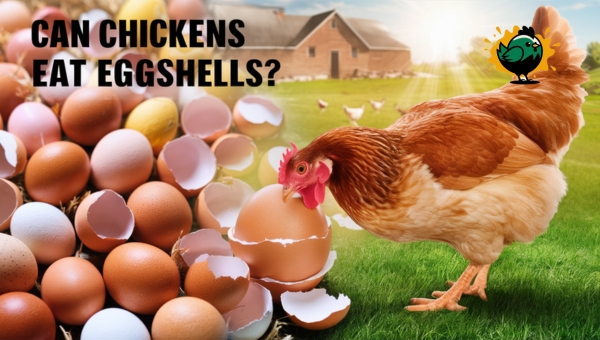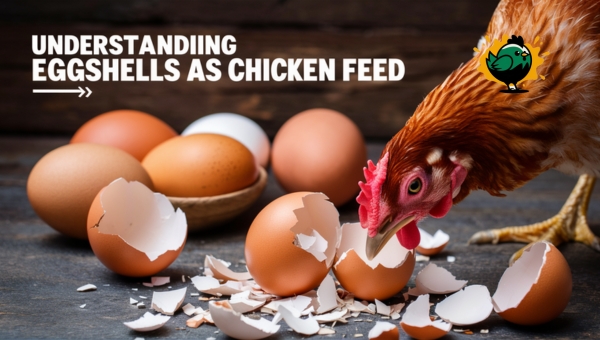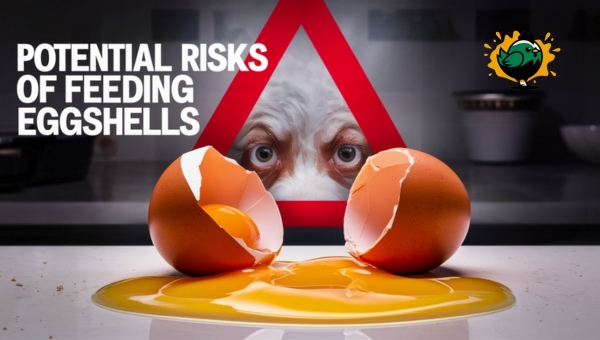Can Chickens Eat Eggshells? You Won’t Believe the Answer

Picture a sunny morning at a bustling farm, Chickens cluck contentedly, pecking away at grains scattered across the ground. Suddenly, a farmer tosses something unexpected into the mix—crushed eggshells. You might wonder, can chickens eat eggshells? This unexpected addition to their diet might surprise you.
Eggshells, often discarded as waste, hold nutritional secrets vital for a chicken’s health. As we delve into this topic, you’ll learn how these humble shells support bone strength and improve egg quality. Join us on this journey to uncover the benefits and potential risks of feeding eggshells to your feathered friends.
Understanding Eggshells as Chicken Feed
Eggshells are a valuable addition to chicken feed due to their high calcium content, primarily composed of calcium carbonate. Chickens require a significant amount of calcium for strong bones and healthy egg production.

By offering crushed eggshells, you not only provide a natural calcium supplement but also help reduce waste, promoting a sustainable feeding practice. It’s important to ensure that the eggshells are clean and properly prepared to minimize any health risks.
This practice is especially beneficial during the laying period when chickens’ calcium needs are heightened. Properly feeding eggshells can contribute to improved egg quality and overall chicken health.
Nutritional Benefits of Eggshells for Chickens
Feeding chickens eggshells comes with several nutritional perks that contribute to their overall well-being and productivity:
- High Calcium Content: Eggshells are composed of about 40% calcium, which is essential for the formation of strong bones and robust egg production.
- Mineral Supplementation: Apart from calcium, eggshells provide trace minerals such as magnesium, phosphorus, and selenium, all of which are crucial for maintaining the health of chickens.
- Bone Health: The calcium in eggshells is easily absorbed by chickens, promoting bone density and reducing the risk of osteoporosis.
- Cost-Effective Solution: Utilizing kitchen waste like eggshells for nutrition is not only economical but also environmentally friendly.
- Enhanced Egg Quality: Regular intake of eggshells can lead to stronger eggshells for the chickens themselves, minimizing breakage during handling.
Also Read: Top Rare Chicken Breeds | A Must-See for Enthusiasts
Potential Risks of Feeding Eggshells
When considering feeding eggshells to chickens, there are essential risks to keep in mind, particularly related to salmonella contamination and egg-eating behavior. Understanding these risks is crucial for maintaining the health and behavior of your flock. Let’s delve deeper into these concerns to provide a clearer picture.

Salmonella Concerns
Feeding eggshells to chickens poses a risk of salmonella contamination. It’s vital to ensure the eggshells are clean and free from bacteria, as contaminated shells can lead to health issues in your flock.
Here are some steps to mitigate these risks:
- Rinse the shells thoroughly after cracking them open.
- Remove the membrane from inside the shells to reduce bacterial presence.
- Bake the shells at a low temperature to kill any bacteria that might be present.
Potential for Egg-Eating Behavior
Another risk of feeding eggshells is encouraging egg-eating habits among chickens. If they begin to associate the taste of eggshells with their own eggs, it could lead to problematic behaviors.
To minimize this risk:
- Crush shells finely so they are unrecognizable as eggs.
- Mix shells with other feed to dilute the flavor and reduce association.
- Monitor chicken behavior regularly to catch any developing egg-eating habits early.
How to Prepare Eggshells for Feeding?
Preparing eggshells for chicken feed involves a few simple steps to ensure they are safe and effective.

Start by following these steps:
- Cleaning: Rinse the eggshells under warm water immediately after use. This helps remove any remaining egg residue and prevents bacterial growth. Be sure to get rid of the inner membrane for quicker drying.
- Drying: Lay the cleaned shells on a paper towel and allow them to air dry for a few days. This step is crucial as it ensures the shells are completely dry, reducing the risk of mold.
- Sterilizing: To add an extra layer of safety, you can bake the dried shells. Place them on a baking sheet and heat in the oven at 200°F (93°C) for about 10 minutes. This process helps kill any remaining bacteria.
- Crushing: Once cooled, crush the eggshells using a mortar and pestle or a food processor. Aim for small pieces, around ½ inch, which are easy for chickens to consume and digest.
Also Read: Treats for Chickens – Cool and Nutritious Frozen Snacks
Alternatives to Eggshells for Calcium Supplements
When considering calcium supplements for chickens, there are several alternatives to eggshells that can effectively support their dietary needs:
- Crushed Oyster Shells: A widely used supplement, oyster shells provide a rich source of calcium. They are often available at feed stores and can be mixed directly into chicken feed.
- Limestone Flour: This fine powder is another excellent calcium source. It is easily incorporated into the chickens’ diet and offers a high level of calcium for strong bone development and egg production.
- Leafy Greens: Incorporating vegetables like kale and spinach can naturally boost calcium intake. These greens not only provide calcium but also add variety to the chickens’ diet.
- Broccoli and Cruciferous Vegetables: Vegetables such as broccoli offer a natural calcium option. They are beneficial for maintaining healthy calcium levels while ensuring a balanced diet.
These alternatives can be integrated into feeding practices to ensure that chickens receive the necessary calcium for optimal health and egg quality.
FAQs
Can chickens eat eggshells safely?
Chickens can indeed eat eggshells safely as long as the shells are cleaned and properly prepared. They offer a great calcium source, which helps in strengthening bones and improving egg quality.
Are there any risks involved in feeding chickens eggshells?
Yes, there are some risks, including salmonella contamination if the shells aren’t cleaned well. Additionally, feeding eggshells might lead to egg-eating behavior among chickens.
What are other calcium sources besides eggshells for chickens?
Alternatives to eggshells for calcium include commercial supplements like crushed oyster shells and limestone flour. Natural sources such as leafy greens and broccoli can also provide calcium.
Conclusion
Feeding eggshells to chickens can offer significant nutritional benefits, particularly as a calcium supplement, which is vital for bone health and egg production. However, it’s crucial to prepare them properly to avoid potential risks like salmonella contamination and egg-eating behavior.
Always ensure that the shells are clean, crushed, and unrecognizable as eggs to provide a safe and effective dietary addition. Exploring alternative calcium sources can further enhance your chickens’ health. By understanding these aspects, you can make informed decisions that promote the well-being of your flock. For more insightful articles on chicken care, visit our site and expand your knowledge!
